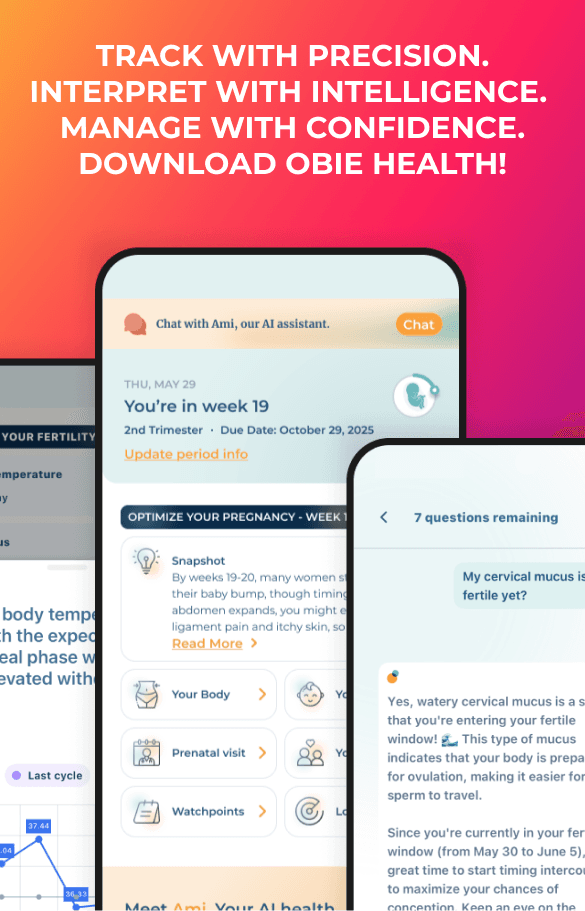Preeclampsia During Pregnancy and Postpartum
Complications
Obie Editorial Team

Preeclampsia is a critical medical condition that affects approximately 10% of women, typically during the second half of pregnancy and in the postpartum period after birth. The hallmarks of preeclampsia include high blood pressure and protein in the urine. Women with preeclampsia may experience headaches and, in severe cases, seizures, marking the transition to eclampsia. Both preeclampsia and eclampsia pose significant risks to the health of both mother and baby and can potentially damage crucial organs, including the brain, heart, kidneys, and liver. While we are still uncovering the exact causes, timely intervention through delivery is generally the course of action. Most women find relief once their baby is born.
Risk Factors:
Pregnancy-Associated Factors
- Carrying multiples such as twins or triplets
- Babies with chromosomal abnormalities
- Hydatidiform mole
- Hydrops fetalis
- Oocyte donation or donor insemination
- Structural congenital anomalies
- Urinary tract infections
Maternal-Specific Factors
- Age: under 20 or over 35
- Hypertension prior to pregnancy
- African-American descent
- Obesity
- Family history of preeclampsia (mother or sister)
- First-time pregnancy (nulliparity)
- History of preeclampsia in past pregnancies
- Existing medical conditions: gestational diabetes, type I diabetes, lupus, renal disease, thrombophilias
- Stress
- New partner
Paternal-Specific Factors
- First-time father
- Previously fathered a preeclamptic pregnancy with another woman
Family History of Preeclampsia
Recently, I consulted with a patient during her first prenatal appointment. She was 8 weeks pregnant following in-vitro fertilization (IVF). In her medical history, there were no notable issues, as she was in good health. However, upon discussing her family medical history, she revealed that her sister had experienced severe preeclampsia and seizures (eclampsia), culminating in the delivery of a baby at 28 weeks.
We took time to thoroughly assess the implications of her sister's history on her own pregnancy. She was genuinely surprised to learn that her sister's experience could elevate her own risk of developing preeclampsia. She shared that her usual Ob-Gyn had not previously discussed this connection with her. If you're curious about your own risk, consider taking the preeclampsia risk assessment.
Family History of Preeclampsia Study
A study published in the British Medical Journal in October 2005 titled "Recurrence of pre-eclampsia across generations: exploring fetal and maternal genetic components in a population-based cohort" provided significant findings:
- Daughters of women who experienced pre-eclampsia had over twice the risk of developing pre-eclampsia themselves (odds ratio 2.2, 95% confidence interval 2.0 to 2.4) compared with other women.
- Men born after a pre-eclamptic pregnancy had a moderately increased risk of fathering a preeclamptic pregnancy (1.5, 1.3 to 1.7).
- Sisters of affected men or women, even those born after pregnancies not complicated by pre-eclampsia, also had an increased risk (2.0, 1.7 to 2.3).
- Women and men born following pre-eclamptic pregnancies were more likely to induce severe pre-eclampsia in their own or their partner's pregnancy (3.0, 2.4 to 3.7 for mothers and 1.9, 1.4 to 2.5 for fathers).
These findings suggest that both maternal and fetal genes from either parent can trigger preeclampsia, with a stronger association noted on the maternal side. Your family's medical history is a critical piece of the puzzle when evaluating your risk, so be sure to discuss it with your healthcare provider.
History of Prior Preeclampsia
If a woman has had preeclampsia in a previous pregnancy, there is a heightened risk of its recurrence in subsequent pregnancies. This risk is influenced by factors such as the mother's overall health, the timing of the initial preeclampsia diagnosis, and the specifics of past preeclampsia experiences. For instance, women with chronic hypertension face a 70% recurrence risk, and those who battled severe preeclampsia during their first pregnancy have a 45% chance of recurrence.
Diet and Preeclampsia
A study highlighted the presence of ergothioneine, an antioxidant found in fungi, in higher levels in the blood of women with preeclampsia compared to healthy pregnant women. This compound is often ingested through unpasteurized dairy products.
Preeclampsia impacts 10% of pregnant women and can result in dangerously high blood pressure and fetal demise, with delivery being the only definitive cure. This discovery of elevated ergothioneine levels could potentially aid early detection and understanding of preeclampsia. While healthcare professionals are not currently advising against the consumption of unpasteurized dairy, further research is needed to explore this correlation. "Recognized as an antioxidant, ergothioneine was expected to help reduce preeclampsia risk, making its overrepresentation intriguing," notes Dr. Fisher. Science remains vigilant in understanding these findings as research progresses.
Migraines and Preeclampsia
We're delving deeper into the potential link between migraines and preeclampsia. With migraines already common among women of reproductive age, eight out of ten studies suggest an association between migraines and preeclampsia. Those with either condition also face heightened stroke risk. Discovering a true connection could unlock insights into the underlying causes of both disorders, potentially preventing adverse pregnancy outcomes and future vascular issues.
More Preeclampsia Information
- Eclampsia and Pregnancy
- Predicting Preeclampsia at 13 Weeks Pregnant
- Your Diet Milk and Preeclampsia
- Doctors May Be Able to Predict Preeclampsia
- Preeclampsia is a Battle Not a Condition
- Placenta Testing Reveals Possible Preeclampsia Marker
- Migraine Headaches and Preeclampsia
- Preeclampsia Short Term and Long Term Effects
- Preeclampsia Levels of Natriuria and Calciuria
- Uric Acid and Preeclampsia
- Postpartum Complications and Pregnancy
- Relationship Between Preeclampsia and Reduced Thyroid Function
- Can Dessert Prevent Preeclampsia?
- Preeclampsia and Advanced Maternal Age
- Fish Oil: Impact on Preeclampsia or Gestational Diabetes?
- What Happens to Children Born to Mothers with Preeclampsia?









